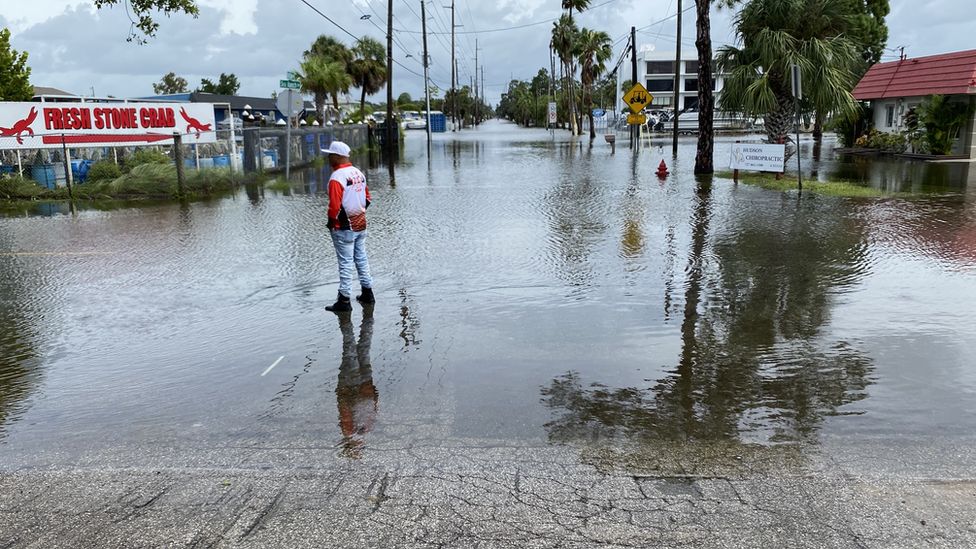When the rain started to get really bad, Brent Berzett and David Hickmon sought refuge on their houseboat.
Their floating home in Hudson, about an hour north of Tampa, certainly wasn’t the worst place to wait out Idalia, a major hurricane that made landfall on Florida’s Big Bend on Wednesday morning.
“The wind wasn’t too bad,” Mr Berzett told the BBC on Wednesday afternoon as they were assessing the damage and mopping up puddles of sea water in their kitchen.
“The carpet’s toast. And some of the furniture too,” he said.
But they were safe, and their neighbours were OK as well.
Some people weren’t so lucky and have lost more as the Category 3 hurricane, with winds up to 125mph (200km/h), barrelled through low-lying towns on Florida’s west coast before making its way inland and into the state of Georgia.
The overall damage is still being assessed, but up and down the coast there is the sense that Idalia could have brought much worse destruction.
By Wednesday night, more than 225,000 people were still without power in Florida, and another 230,000 were in the dark in Georgia.
“I’ve seen people sit in the dark for months after a hurricane,” one linesman in Jacksonville told the BBC.
Up to 40,000 Florida power workers were on standby on Wednesday morning to move in and restore power once the storm passed.
Idalia was downgraded to a tropical storm as it passed through Georgia, though it still brought with it powerful winds and potentially life-threatening weather. Coastal and inland flooding is expected in parts of Georgia, as well as South Carolina and North Carolina, as the storm makes its way along the south-eastern US coast on Thursday.
President Joe Biden warned on Wednesday that the storm is “still very dangerous”.
Multiple Florida counties are still under evacuation orders as of Wednesday evening.
Emergency management officials in Florida said that Perry, a historic town of 7,000 people southeast of Tallahassee, was one of the places that was badly hit.
The hurricane downed powerlines in the town and destroyed stores in its quaint downtown, where multiple businesses had caught fire. One video showed the roof of a gas station get knocked over amid the torrential downpour and powerful winds.
This video can not be played
To play this video you need to enable JavaScript in your browser.
Cedar Key is another town that was badly hit by Idalia, experiencing an almost 9ft (2.7m) storm surge.
- ‘Downtown Cedar Key is underwater’ – resident
Officials said Idalia is the strongest storm to hit this part of Florida in more than 100 years.
There are no confirmed fatalities from the storm, but Florida Highway Patrol has reported that two men died in car crashes caused by rainy conditions.
The storm was felt by the family of Florida Governor Ron DeSantis, whose wife, Casey, wrote on social media that a 100-year-old oak tree fell on the couple’s Tallahassee mansion while she and their three children were inside.
“Thankfully no one was injured,” Casey wrote.

Earlier on Wednesday in Hudson, sheriffs and fire officials used boats and large vehicles to rescue dozens of people who had ignored the mandatory evacuation directive from floodwaters.
“Unfortunately people have their lifelong belongings, and some would rather weather the storm,” said Pasco County Fire Chief Tony Perez told the BBC.
Resident Dan Montey climbed out of one rescue vehicle with his wife Sherri.
- In pictures: Hurricane Idalia brings destruction
- Why a storm surge could be so deadly in Florida
“We were warned last time and it didn’t come, so this time we thought we’d wait it out,” he said. “Well, here we are.”
The smell of smoke from house fires lingered along the roads in Hudson and county sheriffs readied boats to plunge into the floodwaters.
But a feared storm surge didn’t materialise along this stretch of coast, and within hours some residents were wading through what little water remained in order to assess the damage.
The picture was different further to the north.
In the coastal town of Weeki Watchi, in Hernando County, Daniel’e Junggust fears she lost everything.
She was pouring cold beers for the regulars at Tailgators bar, anxious about the damage to her ground-floor apartment just down the road. She hadn’t yet been able to check in after spending the night with her mother inland, but she heard that the water had risen about 7ft or 8ft – enough to ruin everything inside.
“I tried to get as much out beforehand as I possibly could,” she said.
In Hudson, Mr Berzett and Mr Hickmon made their way over their sodden carpet and kept the power to their home switched off as they tried to dry it out.
They moved from Iowa nine years ago, and they’ve noticed the storms have changed in that time.
“They just seem to be getting worse,” Mr Berzett said.
It’s a normally pretty stretch of coastline and jobs and family keep them in the area, but as they mopped up, they were having second thoughts about their Florida home.
“If I had my way,” Mr Hickmon said, “I’d probably be back in the Midwest.”
